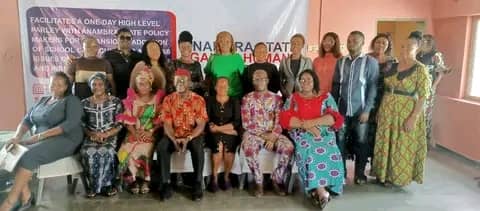Lawrence Nwimo, Awka
The National Agency for Prohibition of Trafficking in Persons and Other Related Matters (NAPTIP) has reported that no fewer than 31 suspects have been arrested for engaging in the business of human trafficking in Anambra State.
It also said about 93 victims of trafficking have been rescued since its commencement of operation in the state in 2021.
The NAPTIP Anambra State Commandant, Idadin Judith Chukwu, disclosed this during the phase 3 launch of the project titled: “Scaling Up Prevention of Human Trafficking and Unsafe Migration in Nigeria,” organised by the Women Aid Collective (WACOL) in Awka, Anambra State capital.
The NAPTIP Boss who spoke through the Deputy State Coordinator Network Against Trafficking, Abuse and Labour (NACTAL), Eucharia Anekwe, said the majority of the victims of trafficking in Anambra State are women and children.
According to her, “From 2021 till the end of 2023, 93 (10 males and 83 female) victims of human trafficking have been rescued. Within the period under review, TIP criminals have been arrested. For instance, 31 suspects (16 males and 15 females) from Anambra and Ebonyi states were arrested.
“In 2022, up to 80 of the criminals (44 males, and 36 females) were nabbed and these are from Anambra, Benue, Imo, Rivers, Ebonyi, and Akwa Ibom States.”
Idadin, who spoke on “The Reality of Human Trafficking & Irregular/Unsafe Migration in Anambra State,” said dominant TIPs identified in Anambra during NAPTIP interventions and environmental scans are illegal adoption, baby factories, domestic servitude, alms begging, child prostitution, and egg/ sperm poaching, among others.
She disclosed that Awka North, Ayamelum, Anambra West, Nnewi North, Ihiala, and Orumba South are the endemic local government areas for trafficking. She also identified Ekwulobia-Umunze-Ihite -Arondizuogu, Owerre-Ezukala-Isuochi, Ekwulobia-Ufuma-Achi, Anambra-Enugu-Kogi roads, among others, as some of the internal routes traffickers operate in the state.
Speaking further, the NAPTIP Boss blamed unemployment, greed, poverty, ignorance, failed apprenticeship, peer pressure, and unwanted pregnancy as the root causes of trafficking in the land.
Meanwhile, WACOL’s Programmes Director, Dorothy Oleka, said irregular and unsafe migration is escalating among the youths of Nigeria.
“This is an era where Japa has become a household word. Almost everybody wants to get out of the country and because of that a lot of people are cashing out on the vulnerability of our Nigerian youths. The youths are unsuspecting of what awaits them. Traffickers tell them a lot of stories to convince them of how greener it is on the other side of the world,” she said.
Oleka, who said that the project is funded by the government of Switzerland, noted that it is particularly prepared to engage policymakers, especially in the education sector, towards expansion and adoption of school curricula to address issues of trafficking in person and unsafe migration in Awka, Anambra State.
“They would buy into the whole idea of expanding the school curriculum and which will allow the teaching of our children as part of civic education so that from school age they would be able to understand issues around trafficking and the dangers associated with it,” she concluded.

